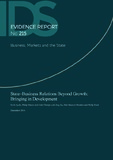| dc.contributor.author | Ayele, Seife | |
| dc.contributor.author | Mader, Philip | |
| dc.contributor.author | Thorpe, Jodie | |
| dc.contributor.author | Gu, Jing | |
| dc.contributor.author | Morales, Mar Maestre | |
| dc.contributor.author | Reed, Philip | |
| dc.coverage.spatial | Chile | en |
| dc.coverage.spatial | China | en |
| dc.coverage.spatial | Ethiopia | en |
| dc.coverage.spatial | India | en |
| dc.coverage.spatial | Tanzania | en |
| dc.date.accessioned | 2016-12-06T18:52:05Z | |
| dc.date.available | 2016-12-06T18:52:05Z | |
| dc.date.issued | 2016-12 | |
| dc.identifier.citation | Ayele, S.; Mader, P. and Thorpe, J. with Gu, J., Morales, M.M. and Reed, P. (2016) State–Business Relations Beyond Growth: Bringing in Development, IDS Evidence Report 215, Brighton: IDS. | en |
| dc.identifier.uri | https://opendocs.ids.ac.uk/opendocs/handle/20.500.12413/12686 | |
| dc.description.abstract | The signatories of the UN Sustainable Development Goals (SDGs) have called on a wide range of businesses ‘to apply their creativity and innovation’ to address sustainable development challenges. Yet the role of business in contributing to development depends profoundly on its interaction with the state. This paper asks how states and businesses interact in different contexts to shape development outcomes. A considerable literature has explored state–business relations in producing investment and growth, and the factors that make these relations effective. However, most of these studies either weakly reflect or fail to
reflect: (a) the process of interactions and how these are shaped by, and at the same time shape, the power and interests of the actors involved; (b) different political and economic contexts; and (c) the implications of state–business relations beyond economic growth. The paper makes the case for analysing state–business relations beyond economic impacts, by considering the implications of these interactions for three defining challenges of the early twenty-first century – namely inequality, exclusion and environmental degradation. Through a review of four case studies from Chile, Tanzania, India and Ethiopia, the paper explores the
actors, structures and processes of state–business relations, along with development outcomes achieved. We employ the concept of ‘negotiation’ as a metaphor to describe the ongoing interaction that is state–business relations, in order to move the frame of analysis towards a goal-oriented process and to highlight the importance of power and interests in relation to these goals. Building on the case studies, we suggest three ways forward to develop clearer models of state–business relations in development. These are:
(1) understanding state–business relations in different institutional contexts, how they emerge and how they operate, and their implications for development outcomes; (2) identifying specific factors that shape the process of state–business relations; and (3) explaining developmental effectiveness of state–business relations, considering also trade-offs and contradictions between different development goals. The challenge of developing adequate frameworks for understanding constantly evolving state–business relations in development is large; but given renewed calls for states and businesses to work together for development, the issues identified here should expectably have a central place on the research agenda. | en |
| dc.description.sponsorship | UK Department for International Development | en |
| dc.language.iso | en | en |
| dc.publisher | IDS | en |
| dc.relation.ispartofseries | IDS Evidence Report;215 | |
| dc.rights.uri | http://creativecommons.org/licenses/by/4.0/ | en |
| dc.subject | Agriculture | en |
| dc.subject | Environment | en |
| dc.subject | Nutrition | en |
| dc.subject | Politics and Power | en |
| dc.subject | Trade | en |
| dc.title | State–Business Relations Beyond Growth: Bringing in Development | en |
| dc.type | IDS Evidence Report | en |
| dc.rights.holder | © Institute of Development Studies 2016 | en |
| dc.identifier.ag | OT/11009/3/3/718 | |
| rioxxterms.funder | Default funder | en |
| rioxxterms.identifier.project | Default project | en |
| rioxxterms.version | VoR | en |
| rioxxterms.funder.project | c941507f-fd0b-4fc3-9822-4b2132f61a1d | en |


